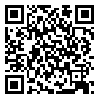Articles In Press
Back to the articles list |
Back to browse issues page
1- Department of Emergency and Critical Care Nursing, School of Nursing and Midwifery, Zanjan University of Medical Sciences, Zanjan, Iran
2- Department of Emergency and Critical Care Nursing, School of Nursing and Midwifery, Zanjan University of Medical Sciences, Zanjan, Iran ,ramezanibadr@gmail.com
3- Department of Psychiatric Nursing, School of Nursing and Midwifery, Zanjan University of Medical Sciences, Zanjan, Iran
2- Department of Emergency and Critical Care Nursing, School of Nursing and Midwifery, Zanjan University of Medical Sciences, Zanjan, Iran ,
3- Department of Psychiatric Nursing, School of Nursing and Midwifery, Zanjan University of Medical Sciences, Zanjan, Iran
Abstract: (899 Views)
Background: Appropriate coping strategies employed by emergency nurses during a pandemic can help reduce their psychiatric issues and positively impact the quality of patient care. This study aimed to determine how different coping strategies of emergency nurses relate to their mental health symptoms during the COVID-19 pandemic.
Materials and Methods: This descriptive-correlational study was conducted on 125 emergency nurses in three teaching hospitals in Iran. The participants were included in the study using stratified random sampling. Data collection tools included the nurses' demographic and occupational characteristics questionnaire, the Perceived Stress Scale (PSS-14), the Hamilton Anxiety Rating Scale (HAM-A), the Hamilton Depression Rating Scale (HAM-D), and the Ways of Coping Questionnaire (WCQ). Significance was set at p < 0.05.
Results: According to the results, 97.5%, 66.4%, and 60.8% of the nurses experienced mild to severe stress, anxiety, and depression, respectively. In our study, nurses utilized emotion-oriented strategies mainly to manage their mental health symptoms. A statistically significant relationship existed between mental health symptoms and certain coping strategies (p<0.05). Increased stress, anxiety, and depression led nurses to adopt certain negative coping strategies, especially Escape-Avoidance, in addition to adopting positive coping strategies.
Discussion: Emergency nurses experience significant stress, anxiety, and depression, primarily using positive emotion-focused coping strategies. However, as their symptoms worsen, they shift towards negative coping behaviors.
Conclusions: Preventive interventions are crucial for emergency nurses, particularly during natural disasters, to reduce stress, anxiety, and depression by promoting effective coping strategies and mitigating negative ones, given the prevalence of mental health symptoms.
Materials and Methods: This descriptive-correlational study was conducted on 125 emergency nurses in three teaching hospitals in Iran. The participants were included in the study using stratified random sampling. Data collection tools included the nurses' demographic and occupational characteristics questionnaire, the Perceived Stress Scale (PSS-14), the Hamilton Anxiety Rating Scale (HAM-A), the Hamilton Depression Rating Scale (HAM-D), and the Ways of Coping Questionnaire (WCQ). Significance was set at p < 0.05.
Results: According to the results, 97.5%, 66.4%, and 60.8% of the nurses experienced mild to severe stress, anxiety, and depression, respectively. In our study, nurses utilized emotion-oriented strategies mainly to manage their mental health symptoms. A statistically significant relationship existed between mental health symptoms and certain coping strategies (p<0.05). Increased stress, anxiety, and depression led nurses to adopt certain negative coping strategies, especially Escape-Avoidance, in addition to adopting positive coping strategies.
Discussion: Emergency nurses experience significant stress, anxiety, and depression, primarily using positive emotion-focused coping strategies. However, as their symptoms worsen, they shift towards negative coping behaviors.
Conclusions: Preventive interventions are crucial for emergency nurses, particularly during natural disasters, to reduce stress, anxiety, and depression by promoting effective coping strategies and mitigating negative ones, given the prevalence of mental health symptoms.
Keywords: mental health, coping strategies, emergency nursing, emergency services, pandemics, COVID-19
Send email to the article author
| Rights and permissions | |
 |
This work is licensed under a Creative Commons Attribution-NonCommercial 4.0 International License. |







